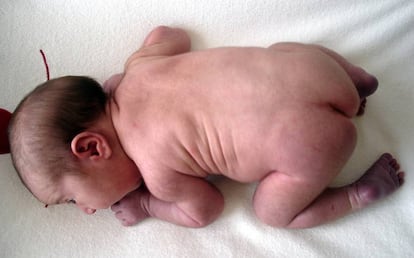Parents who have a home birth in Spain without medical assistance could end up in prison
Court upholds 15-year sentence against couple for failing to properly care for newborn, who died as a result

Parents in Spain who reject medical help for their children could be held accountable by the justice system if this decision causes harm to the child. This is the warning that has come from the latest Supreme Court ruling, which upheld a 15-year prison sentence against a couple for the death of their newborn daughter. The couple had decided to have a home birth without medical assistance, and the baby died when she did not receive the necessary care and was not brought to a doctor when her symptoms worsened.
The parents only took their baby to the hospital once she had died
Of the women who choose to give birth at home (a minority in Spain), there is an even smaller group who forgo any medical assistance. They argue that giving birth is a physiological process that a woman’s body is prepared to do naturally and that, in most cases, hospitals pervert the process with aggressive interventions that hurt both the mother and the child.
The Supreme Court ruling has warned that parents who opt for these types of home births may be found negligent if the newborn is injured as a result of their choice. “A birth, while being a natural act, can present severe risks to the mother and the newborn baby, which means that duty of care must be upheld,” the sentence reads.
Negligence is a crime that occurs when a person fails in their specific duty of care that results in harm – whether or not it was intentional. In this situation, parents could be charged with reckless injury if the baby is hurt as a result of their decision to have a home birth without medical assistance. In the worst-case scenario, the parents could be charged with involuntary manslaughter.
Crime of omission
The warning of the Supreme Court is especially important because in the current case, there is no evidence of a reckless act – which carries a shorter sentence. Instead the parents committed a crime of omission because they failed to take their daughter to a doctor even though the baby showed clear signs she needed help. Her death has been blamed on this failure.
Duty of care must be upheld Spanish Supreme Court
According to the official account, the mother decided that she would give birth at home without the help of a medical professional and the father agreed. After the birth, they did not cut the umbilical cord, clean the secretions or properly wrap up the child. The parents didn’t feed her the next day or take her to the hospital despite signs that her life was in danger (she was breathing less frequently and was increasingly still). They only took her to the hospital once she had died.
Regarding the decision to charge the parents with the more serious crime, the court explained: “Knowing the risk [of a home birth without medical help] and the evident obligation of the caregiver, their passivity is indicative that they accepted the outcome or, at least, were indifferent to it.”
For this reason, the court ruled to uphold the 15-year-prison sentence against the mother and father of the deceased child.
English version by Melissa Kitson.
Tu suscripción se está usando en otro dispositivo
¿Quieres añadir otro usuario a tu suscripción?
Si continúas leyendo en este dispositivo, no se podrá leer en el otro.
FlechaTu suscripción se está usando en otro dispositivo y solo puedes acceder a EL PAÍS desde un dispositivo a la vez.
Si quieres compartir tu cuenta, cambia tu suscripción a la modalidad Premium, así podrás añadir otro usuario. Cada uno accederá con su propia cuenta de email, lo que os permitirá personalizar vuestra experiencia en EL PAÍS.
¿Tienes una suscripción de empresa? Accede aquí para contratar más cuentas.
En el caso de no saber quién está usando tu cuenta, te recomendamos cambiar tu contraseña aquí.
Si decides continuar compartiendo tu cuenta, este mensaje se mostrará en tu dispositivo y en el de la otra persona que está usando tu cuenta de forma indefinida, afectando a tu experiencia de lectura. Puedes consultar aquí los términos y condiciones de la suscripción digital.








































